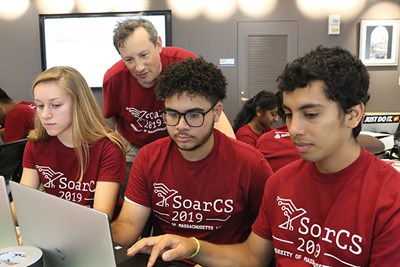‘First to Launch’ Introduces Incoming Students to Campus – In Person
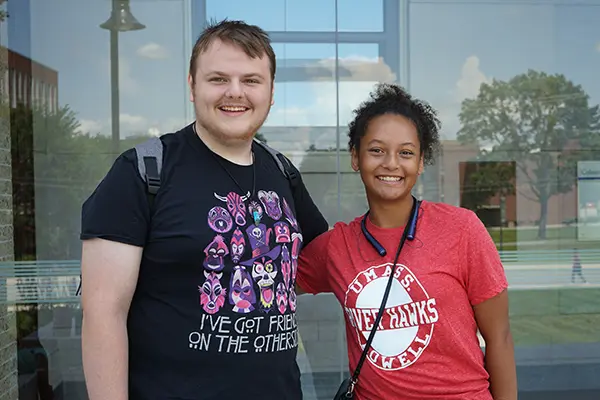 Image by Katharine Webster
Image by Katharine Webster
08/04/2021
By Katharine Webster
Maddie Emond, an incoming computer science major from Dracut, Massachusetts, signed up for the First to Launch summer program because she could take a class – Calculus 1A – for free.
But the biggest incentive? First to Launch would be running on-campus workshops every Friday that would teach her how to navigate college and introduce her to university people, places and services – as well as to other first-generation college students.
After 16 months of mostly remote learning and social isolation during the COVID-19 pandemic, Emond couldn’t wait.
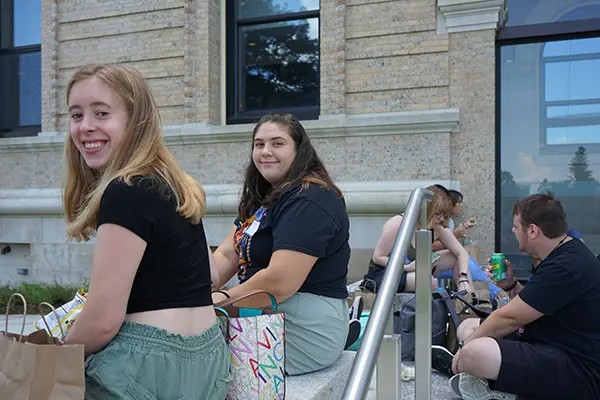 Image by Katharine Webster
Image by Katharine Webster
“I just wanted to meet people, so when they said, ‘We’re going to be meeting in person,’ I said, ‘Sign me up!’” she says.
First to Launch is a new pilot program run by the River Hawk Scholars Academy (RHSA), a university support program for first-generation college students. It complements the Launch! program, which was started in summer 2019 to help incoming first-year students get a jump on their college careers. Through Launch, students can take one or two summer classes at a reduced cost and enroll in a free, one-credit seminar in their college. They can also participate in practical workshops to help prepare them for the fall semester.
RHSA First to Launch is the newest of UML’s summer bridge programs, which also include RAMP for engineering majors and SoarCS for computer science majors, both meeting in person on campus.
Summer bridge programs are effective in preparing students for the college experience, and that’s especially true for first-generation college students, who comprise 41% of UMass Lowell undergraduates, says RHSA Director Matthew Hurwitz, an associate teaching professor in the English Department.
 Image by Katharine Webster
Image by Katharine Webster
“No one is born as a college student,” Hurwitz told 30 students in the First to Launch program on a Friday in late July. “Learning how to be a college student is part of going to college.”
Kimberley Owens, a political science major from Boston, says an RHSA peer leader helped her choose a world language to study – she decided on Arabic – and she’s also learning how to manage her independent study time.
Her favorite part of First to Launch, though, is talking with other students “with similar mindsets who also might be anxious because our parents didn’t go to college,” while exploring their identities and strengths as first-generation college students.
“I like the program and meeting people and learning what being a first-generation student is all about, and also seeing the academic setting,” she says.
Grants Help RHSA Expand
First to Launch is just one way that the RHSA is expanding its services to first-generation college students, thanks to two $100,000 grants it has received in the past year from the Cummings Foundation and Bank of America.
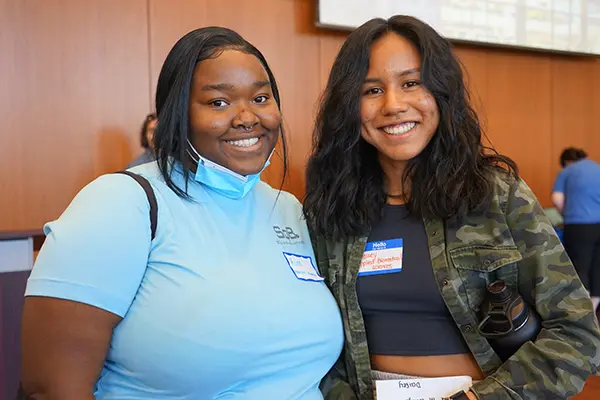 Image by Katharine Webster
Image by Katharine Webster
River Hawk Scholars entering UMass Lowell this fall will now be able to continue with the full program, including peer mentoring, through their sophomore year.
“Year One is the year of support,” Hurwitz says. “Year Two is the year of opportunity,” when programming will help students dive deeper into their education through experiences including mentoring relationships with adult volunteers, research with faculty,study abroad, service learning and leadership training.
The grants will also allow the RHSA to develop workshops for juniors and seniors that will prepare them for the transition to careers and graduate school, he says.
Now embarking on its fifth year, the RHSA has already won national recognition. The Center for First-generation Student Success has named UMass Lowell a First-gen Forward Advisory Institution, a model for other colleges and universities to follow. UMass Lowell’s own enrollment data show that the RHSA improves the chances that first-gen students will stay in school their first year by 5 percentage points, compared to their first-gen classmates who are not in the program.
Peer-to-peer Support
Peer leaders are a key part of the RHSA and First to Launch. On Tuesdays, the students in First to Launch meet one-on-one with their peer leaders. On Fridays, the peer leaders come up with an activity to start the in-person meetings in Coburn Hall. That’s followed by a “core” learning experience, such as a financial aid workshop, and then lunch and a chance to socialize.
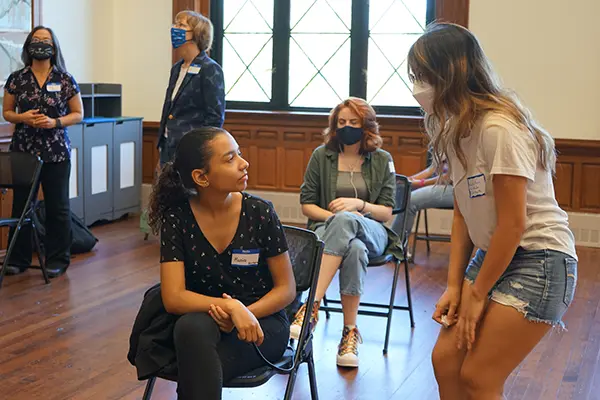 Image by Katharine Webster
Image by Katharine Webster
On a recent Friday morning, the peer leaders gave the students a quiz on different student services, campus offices and terms they had heard about in previous sessions. Next, a panel of faculty members – nearly all of them first-generation college graduates – shared personal experiences and talked about how to make use of advising services, research opportunities, study abroad, professors’ office hours and networking. A couple of associate deans dropped by to chat with students, too.
“Every Friday is the highlight of my week, just because I get to be around a bunch of people who are all really awesome – my classmates, the peer mentors and the people they bring in to talk to us,” says Camden Hedrick, an incoming psychology major from Stevensville, Maryland.
Hedrick and Jayla Josey, a psychology major from East Bridgewater, Massachusetts, both took advantage of the full Launch program, including the First to Launch scholarship that allows them to take one class for free: Introduction to Ethics for Hedrick and Introduction to Psychology for Josey.
Although their classes are online, Josey and Hedrick are living on campus during the six-week program. That means Josey can talk to her peer leader, senior public health major Monica Kong, in person every Tuesday. Josey says she can ask Kong about anything, including where to find the best Asian food near campus.
“She’s really nice. I’m excited every Tuesday,” Josey says. “Every week she asks for feedback on the program, any fun activities we could do during the Friday social events, how I’m doing in classes, and if I have any questions about next steps, either with the summer program or the fall semester – basically anything that I need help with. She’s a great resource.”
Hedrick, who also has Kong for a mentor, appreciates the guidance.
“My main reason for joining the RHSA was the free summer course, but now that I’m actually in the program, it’s amazing,” Hedrick says. “Having a support group with everyone is awesome.”
And the best part? He and Josey have become fast friends. They hang out together in River Hawk Village, work out together at the Campus Recreation Center, and go for a walk every day to explore the campus and the city.
“We’re besties now,” Josey says.


